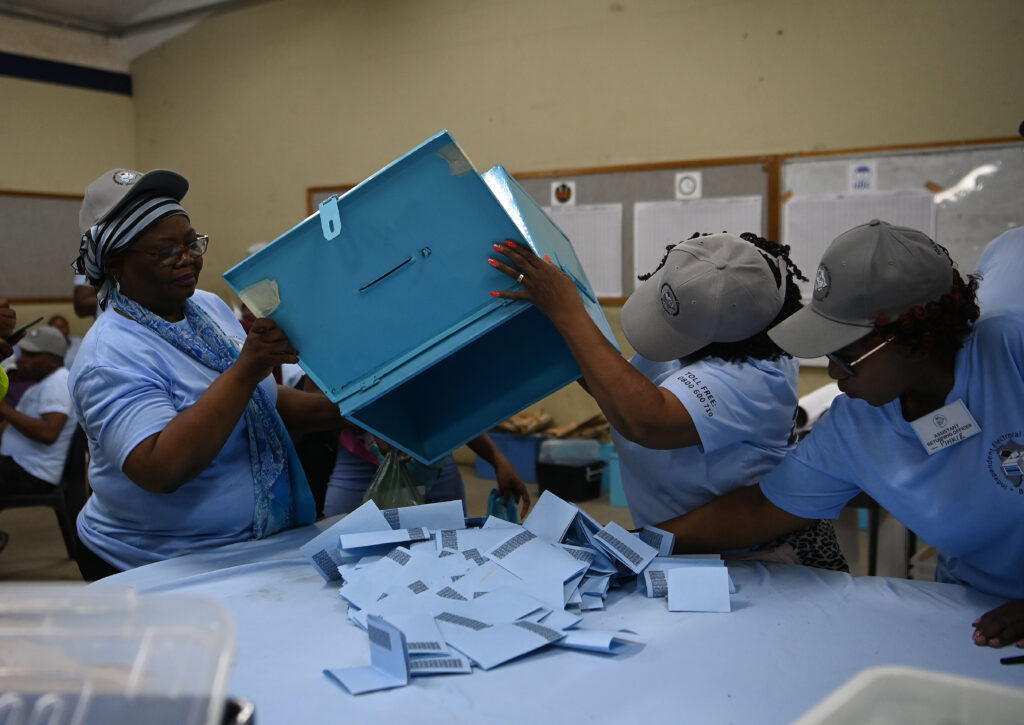Botswana counted votes Thursday from elections in which the ruling party headed by President Mokgweetsi Masisi is facing a strong challenge from an opposition alliance as it seeks to extend its six-decade grip on power.The conservative Botswana Democratic Party (BDP) had expected to retain control of parliament in the diamond-rich nation after Wednesday’s vote in the arid and sparsely populated nation. But preliminary results for the separate local council ballot indicated a strong performance by the left-leaning Umbrella for Democratic Change (UDC), which some commentators said could indicate a national trend.Counting extended into the evening as the election authority said the turnout appeared higher than expected, altough it could not yet provide figures.More than one million people were registered to vote, from a population of 2.6 million, with concerns about unemployment and mismanagement in Masisi’s first term a leading complaint. Under Botswana’s first-past-the-post system, the first party to take 31 of the 61 parliamentary seats will be declared the winner and install its candidate as president.Masisi, 63, said after voting Wednesday that “victory is certain” for his second term. His challengers are UDC leader Duma Boko, a 54-year-old human rights lawyer; Dumelang Saleshando, 53, from the social democratic Botswana Congress Party (BCP); and the populist Botswana Patriotic Front’s (BPF) Mephato Reatile, 57.It is the third time that the Harvard-educated Boko has run for the presidency under the UDC which he formed more than 10 years ago to unite against the bulwark of the BDP, which has held power since independence in 1966. “It’s been much too long to be operating under a system that has consistently produced the same, at best, mediocre results,” Boko said in an interview with South African channel ENCA in July.”The people in the country are clamouring for change, they are yearning for something refreshingly different,” he said.The unemployment rate has risen to 27 percent, with younger people most affected, and the economy has seen a slump due in part to weakened diamond sales, Botswana’s single biggest revenue earner.There have also been allegations of government corruption, nepotism and mismanagement, while the gap between the rich and poor is one of the largest in the world, according to the World Bank.In 2023, growth fell to 2.7 percent from 5.5 percent a year earlier, the International Monetary Fund said. It is projected to slump to one percent in 2024.- Priorities -The UDC complained of irregularities on voting day Wednesday in a similar scenario to the 2019 election when it attempted to have the results thrown out but its case was dismissed in court.”Our fear is that we are going to have another rigged election just as in 2019,” head of a UDC monitoring group Mike Keakopa said.The new government will need to focus on weaning the country off its diamond dependency, analysts said.”The first priority for the next government or president would be to stabilise the economy, create a degree of strategic certainty in the mining sector,” independent political commentator Olopeng Rabasimane said.”The second has to be employment generation, especially for young people. The third one would be diversification of the economy away from dependency on diamonds,” he said.Botswana should boost technology, tourism and agriculture, commentator for the Sunday Standard newspaper Victor Baatweng said.The country is a beef exporter and also a destination for high-end safari tourism, with the Okavango Delta in the north a UNESCO-listed heritage site.
